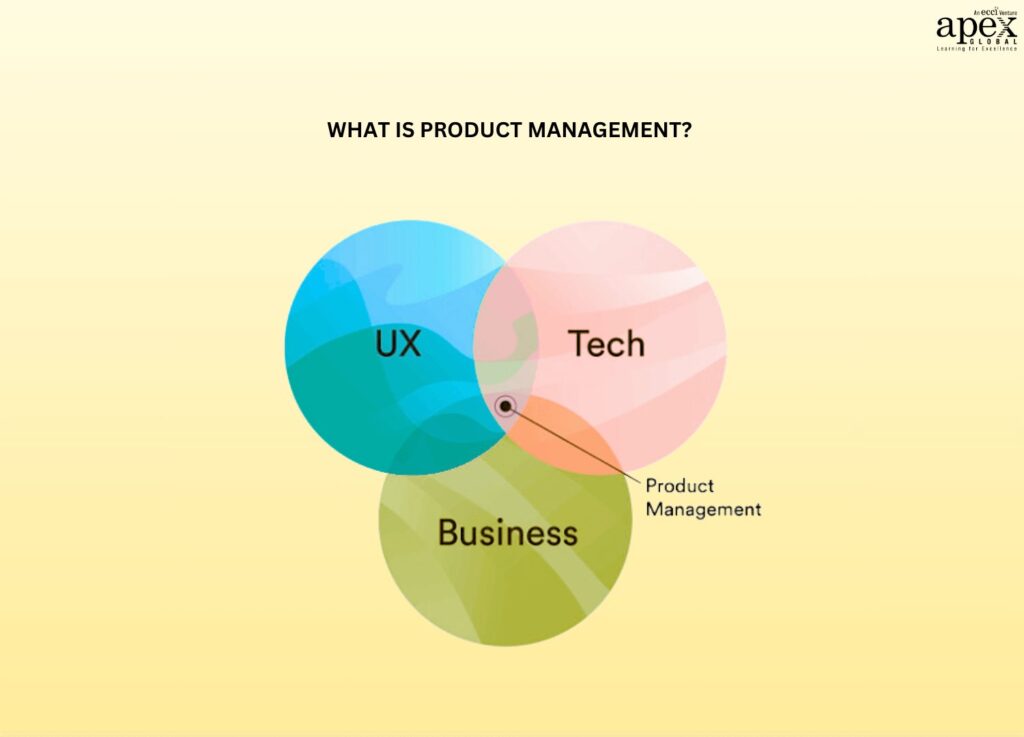While enjoying your favorite series on a streaming service or chatting with your friend on a social media platform, have you ever wondered who helped build these digital experiences?
The truth is, multiple individuals have a hand in creating these products. However, when it comes to crafting any digital experience, product management stands out as one of the most important factors.
From smartphones to cozy sweaters, each successful product is the result of extensive research, testing, and design processes.
Product management allows business owners to learn crucial information, such as whether a product appeals to consumers or which features to include. Businesses of all sizes can develop and release outstanding products with a great product management foundation.
So, what exactly is product management?
In this blog, we’ll look at what product management is, the responsibilities of a project manager, and the importance of product management training. But that’s not all, we’re also going to guide you through the process of finding the best product management training for you.
Ready to dive in? Let’s go!
What you'll find in this article [hide]
- 1 What is product management?
- 2 What does a Product Manager do?
- 3 Product Management vs. Project Management
- 4 Importance of product management training
- 5 How to find the best product management training for you?
- 6 Factors to consider when choosing a product management training
- 7 Learn product management with APEX Global Learning
- 8 Wrapping up
What is product management?
Product management encompasses a wide-ranging area of responsibilities. The role itself means very different things in different organizations.
Martin Eriksson, a product management expert and the current Product Partner at EQT Ventures, defines product management as an “intersection between business, technology, and user experience”.

Here is a simple definition we’ve come up with for the question: Product management is the organizational role that is responsible for overseeing the entire lifecycle of a product. From its conception through development to the point of reaching the shelves, the product management process guarantees the seamless flow of operations at every stage.
This entire process unfolds across multiple stages, involving various roles and departments within a company. However, the ultimate goal of product management is to make sure that the product delivered to the customer is the best possible version of itself.
Of course, this is an abstract explanation of the role. So, what does the job actually entail? Let’s discuss this in the following section.
What does a Product Manager do?
The daily responsibilities of a Product Manager vary depending on the size of the company. But, most product managers spend the majority of their time focused on the following tasks:
- Conducting market research to understand customers and competitors.
- Developing strategies for new products that address company goals, customer needs, and external influences.
- Planning project timelines that address when a product reaches each developmental phase from inception to completion.
- Creating a product vision and communicating plans and strategies to key stakeholders, including investors, the product development team, and company executives.
- Maintaining a product roadmap and ensuring it is followed or updated as needed.
- Coordinating a product’s developmental process with relevant teams.
- Interpreting feedback from customers, performing data analysis to improve future product management strategies, and relaying findings to relevant teams.
Product Management vs. Project Management
Product management should not be confused with project management. Although they sound similar, they are distinct domains with unique focuses and responsibilities. While the confusion between the two is common, understanding their differences is crucial for effective business operations and successful product development.
Here is a quick way to differentiate between the two:
Product management is a process that aims to solve the customers’ problems and meet market demands. It has a whole lifecycle that involves the conception of a product idea, its development, and its launch into the market. It is an ongoing process that continues even after a product has been launched.
Project management, on the other hand, is a process of completing the tasks and achieving the goals of a specific project. It’s a temporary undertaking that’s started to create a new product/service within set deadlines.
Importance of product management training

If you’re interested in getting into product management or are already working in this field but looking to expand your knowledge, then a product management training program might be just what you need. Why, you ask?
Here are a few benefits of taking a product management course:
- You can enhance your skills and knowledge.
- You’ll gain an in-depth understanding of strategies and best practices.
- You’ll be able to demonstrate experience to potential employers.
- You can improve your career prospects and job opportunities.
- You’ll get access to a community of product managers for networking and support.
- You can keep up to date with the latest industry trends and developments.
- You’ll be able to improve your credibility and reputation as a Product Manager.
- You can help your organization develop a functional and efficient product management team.
How to find the best product management training for you?
Now that we’ve explored the benefits of product management training, how can you identify the best product management training? Let’s take a look.
Step #1: Assess your skillset
The first step is to assess your skillset and determine what you need to learn. If you’re starting from scratch, you can consider taking a comprehensive course that covers all the basics.
Alternatively, if you already have some experience, you can choose a course that focuses on specific areas you need to learn more about.
Ask yourself: What skills will help you do your job better? Are there any areas of product management where you are less confident?
Step #2: Consider your resources
The next step is to evaluate your resources. Consider your budget carefully and make sure the price of the course you’re considering is within your financial means.
Then, you’ll need to think about how much time you can allocate for the training. Some courses can be completed in a few days, while others may take several weeks or even months.
Do you have the capacity to take on a long training alongside your job and other responsibilities? Or do you only want to target specific skills more relevant to your role and require less time commitment?
Step #3: Determine your preferred learning style
Some people prefer learning by doing, while others are more comfortable watching prerecorded video tutorials. So, when narrowing down options, think about whether you prefer learning in a structured environment or if you prefer a more relaxed approach that allows you to learn at your own pace.
Depending on what your preferred learning style is, you might either choose an online course with set modules, deadlines, and an end-point assessment or live workshops (in-person or virtual) that include interaction with other learners.
Step #4: Consider whether you need a certification
The final step is determining whether you need a certification. A certificate can help you stand out when applying for jobs. However, some companies may place a higher value on practical experience and skills. So, if you decide that certification is important to you, ensure the product management course you’re considering can offer it.
Factors to consider when choosing a product management training
In addition to the steps discussed above, here are some important factors to consider when choosing a Product Manager training program:
- Reputation and accreditation: Look for programs offered by reputable institutions or organizations with a track record of delivering high-quality training.
- Curriculum: Ensure that the program covers the essential skills you want to develop and provides a comprehensive understanding of product management.
- Delivery method: Check whether the training is delivered in-person, online, or as a combination of both, and choose the format that aligns with your learning preferences.
- Cost and Return on Investment: Evaluate the program’s cost in relation to the value it provides. Consider how the acquired knowledge and skills will contribute to your professional growth.
- Instructor: Check if the instructor has significant product management experience. It will ensure that you get practical, real-world advice and not just theoretical knowledge.
- Hands-on learning: Make sure there are sufficient hands-on exercises in the course that can give you a real taste of what product management is like.
Learn product management with APEX Global Learning
APEX Global’s Product Management Practitioner course is a 16-hour immersive product management training program designed to empower professionals not only to build the right products but to build them right.
Led by industry experts, the course delves into the core elements of product management, offering a blend of structured curriculum, engaging case studies, and hands-on activities.
From understanding what makes a product successful in the market to creating user personas and bringing your ideas to life, we’ve got you covered. You’ll also be able to learn how to use the necessary tools and techniques in every phase of product development to formulate a market-winning product.
So, if you’re ready to transform your passion for product management into expertise, hop on board with our product management course. Enroll today and get started on your journey toward product management excellence!

Wrapping up
Ultimately, the role of product management is all about strategy. Product managers first create the product strategy and effectively present it. Then, they make sure that all decisions related to development, marketing, etc., are consistent with the strategy.
Product managers work at the intersection of business leaders and technology and play an important role in ensuring that new products/features are successful for both their organization and their consumers.
For those who are passionate about teamwork, strategic thinking, and creating amazing experiences for people, product management could be a very rewarding career choice. And there’s no better way to embark on this exciting journey than by enrolling in our Product Management Practitioner course.
Have any questions? Reach out to us today! We’d love to hear from you.


